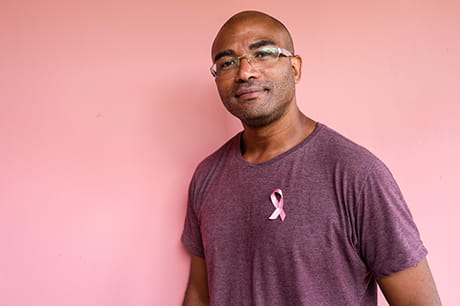7 questions to ask if you’ve been diagnosed with cancer
Being prepared can help reduce stress and make sure your next appointment goes as smoothly as possible.
by Dr. Muhammad Memon, hematologist oncologist
If you’ve been diagnosed with cancer, you probably have lots of questions. Getting answers can help keep you in the driver’s seat.
By learning as much as possible about your diagnosis and treatment options, you’re able to play an active role in your care.
Take time to consider what you’d like to know and write down all your questions, so when you get to your next appointment, you’re prepared.
Not sure what to ask?
Here are a few questions to get you started.
1. What type and stage of cancer do I have?
Your provider will talk with you about the type of cancer you have and where it’s located. This information helps guide treatment options.
2. What are my treatment options?
Your provider will discuss available treatments based on your specific type and stage of cancer. They may also discuss options like clinical trials or a bone marrow transplant. After you’ve considered your options, your provider will work with you to develop a customized treatment plan.
3. What are the risks and benefits of treatment?
Discuss risks and benefits with your provider. They can offer insight about things like:
- Effectiveness of your treatment
- How treatment will be given (oral, intravenously, etc.)
- Side effects and how to manage them
4. Will my insurance cover treatment?
Before you decide on treatment, contact your insurance carrier to determine what your benefits will cover. Your insurance company can also tell you how much you can expect to pay out-of-pocket. If you don’t have insurance or need help with costs, financial help may be available. Talk to your healthcare provider.
5. How often do you treat this type of cancer?
If you have a more specific or rare type of cancer, like a sarcoma, it may be better to seek treatment at a center that sees more cases. For a less common cancer, it may be helpful to get another opinion.
6. Do you recommend getting a second opinion?
If you’re looking for more information about your cancer treatment, a second opinion may offer options you hadn’t considered. If you choose to get one, your healthcare provider can help guide you through the process.
7. What support services are available?
Your provider can help connect you with resources for things like:
- Managing symptoms
- Communicating your healthcare preferences
- Assistance with creating an advance directive
- Emotional support for you and your loved ones
As you ask your questions, there may be a lot to remember. To keep track of your provider’s answers, it’s a good idea to:
- Bring a notebook to record details
- Use a smartphone or tape recorder to document responses
- Bring a family member along to help take notes
If you’re seeing a Geisinger provider and you have a MyGeisinger account, you can log in to your account to review your after-visit summary and notes. If you find yourself with more questions after your visit, send your provider a secure message.
Remember, there’s no such thing as too many questions. No matter what your concerns are, we’ll be here to address them at every step along the way.
Next steps:
Learn about cancer care at Geisinger
Read Carmella’s story: “I found a lump in my breast while breastfeeding”





